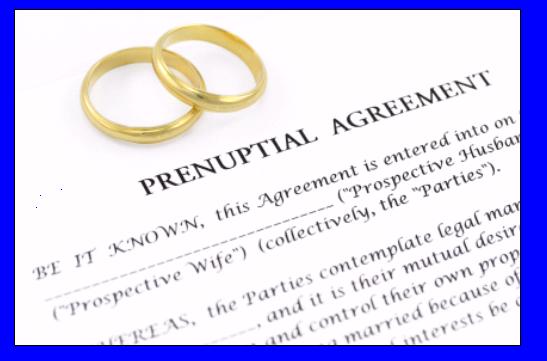What is a Prenup?
A prenuptial agreement (prenup) is a legally binding contract signed by couples before they get married that dictates how their assets, debts, and financial matters will be handled if they divorce or one passes away. It helps clarify financial expectations and prevent disputes.
While discussing a prenup might not seem romantic, it is a practical financial tool that offers security and peace of mind for both partners. Many couples use prenups to protect assets, clarify responsibilities, and avoid potential legal battles in the future.
How Do They Work?
A prenup is a financial contract that outlines how a couple will handle property, income, and debts before, during, and, if necessary, after marriage. It can determine whether assets remain separate or become shared marital property, which is relevant in community property states where assets acquired during the marriage are automatically split unless a prenup states otherwise. If one spouse enters the marriage with significant debt, like student loans, a prenup can clarify that the other spouse will not be responsible for repaying it.
Many couples use prenups to establish whether alimony will be paid if they get divorced or to protect business interests by keeping ownership solely with one spouse. If someone has children from a previous marriage, a prenup can also protect inheritance rights, keeping certain assets separate from marital property.
Here’s a Hypothetical Example of a Prenup in Action:
Let’s say John owns a family-run business and wants to keep it separate from marital assets. His fiancée, Sarah, has student debt and wants to keep John from being responsible for it. Their prenup states that John’s business remains his sole property, and Sarah’s student loans remain her individual obligation.
A prenup can’t determine child custody or child support, since courts decide these matters based on the child’s best interests at the time of separation.
Who Should Consider One?
Prenups aren’t just for the wealthy. Many couples can benefit from one, especially those going into a marriage with significant assets, debts, or business interests. A prenup can also be useful for individuals who expect a significant increase in income or who live in a community property state where marital assets are automatically divided. For these couples, a prenup provides financial protection and helps both partners understand their rights and obligations before marriage.
How to Get a Prenup
The process of getting a prenup should begin early. Waiting until just before the wedding can lead to complications and even cause the agreement to be challenged in court. Both individuals should hire their own attorneys to make sure the prenup is fair and legally sound. A prenup lawyer will ensure that the agreement complies with state laws and that both parties’ interests are protected.
Full financial disclosure is a necessity. Each partner must provide a complete picture of their assets, debts, and income. Hiding financial information could invalidate the prenup. After both parties agree to the terms, the agreement must be signed and, in some cases, notarized to strengthen its legal standing. If a prenup is one-sided or appears unfair, courts may reject it, so it’s important to have both individuals agree to reasonable terms.
Can You Get a Prenup After Marriage?
A prenup must be signed before marriage, but couples who want similar protections can create a postnuptial agreement instead. A postnup functions like a prenup but is signed after the wedding. It can outline how assets and debts will be handled moving forward, protecting new assets acquired during the marriage.
While postnups are legally recognized, they tend to be scrutinized more heavily by courts than prenups. Judges may question whether both parties agreed to the terms voluntarily or if the agreement was created in response to marital tension. Couples considering a postnup should consult a lawyer regarding its enforceability.
How Much Does a Prenup Cost?
The cost of a prenup varies depending on complexity, location, and attorney fees. A simple prenup may cost between $500 and $1,000, while a more complex agreement that includes business assets or significant financial considerations can range from $2,500 to $10,000. The national average cost is around $650, but prices differ based on state laws and legal representation.
Although a prenup requires an upfront investment, it can prevent costly legal disputes in the future. Divorce proceedings can be expensive, and a prenup helps streamline financial matters, reducing the likelihood of prolonged legal battles.
Are Prenups Enforceable?
For a prenup to be legally enforceable, it must be in writing and signed voluntarily by both parties. A court may invalidate a prenup if there is evidence of coercion, if one party did not fully disclose their financial situation, or if the agreement is too one-sided.
The importance of full financial disclosure can’t be stressed enough. Courts may reject an agreement if it is later discovered that one spouse concealed significant assets or debts. A prenup must also be fair—if a judge determines that the terms are grossly unfair to one party, they may refuse to enforce it.
When properly drafted and executed, a prenup provides security and clarity. It ensures that financial matters are settled in advance, reducing the potential for disputes and uncertainty.
Is a Prenup Right for You?
A prenup offers financial clarity, asset protection, and legal security. Some people view it as planning for divorce, but many couples see it as a responsible financial planning tool that protects both parties.
If you are considering a prenup, consulting a prenup lawyer can help ensure your agreement is fair, legally sound, and tailored to your needs. The earlier you begin the process, the smoother it will be. Taking this step now can provide peace of mind and prevent future financial disputes.
Resources:
https://www.actec.org/resource-center/video/what-is-a-prenuptial-agreement/




